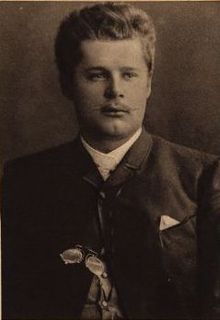Carl Ludwig Schleich
| Carl Ludwig Schleich | |
|---|---|
 |
|
| Born |
19 July 1859 Stettin, Pomerania. |
| Died | 7 March 1922 (aged 62) Bad Saarow |
| Occupation | physician, philosopher, writer, musician, painter |
| Known for | introducing local anaesthesia into clinical practice |
Carl Ludwig Schleich (19 July 1859 – 7 March 1922) was a German surgeon and writer. He is best known for his contribution to clinical anesthesia. In addition, he was also as a philosopher, poet and painter.
Schelich's ancestors were a Munich family of prominent painters who had moved to Freienwalde. They included Robert Schleich and Eduard Schleich the Elder.
From a very early age, Schleich was exposed to a background in biology. His father was very interested in natural history and the leading theories in the epoch. Later Schleich would recall:
In the year 1864, Graefe was a guest in my father's house during the historic conference of biologists, at which Darwin, Haeckel, and Virchow were the mutually hostile protagonists. I, alas, who was only five years of age, was not even aware of this earth-shaking event, since I was lying unconscious in the grip of meningitis.
In his childhood, he frequently heard "extremely vigorous" debates about the existence of God, since his father was an unbeliever and his uncle, Hermann Frederick, a pastor. These conversations caused a deep impression of Schleich, awho later wrote:
It is strange to note how deeply many of the arguments for and against the existence of God and immortality impressed themselves on my young mind... Such arguments would occupy me for days, and I recalled them during our divinity lessons, and even to this day they have their repercussions in my philosophical reflections.
Following this period, Schleich was confirmed and wanted to become a pastor.
Later, however, Schleich decided to study medicine in Zurich, Greifswald and Berlin, where he was an assistant to the prominent anthropologist Rudolf Virchow. In 1887, Schleich received his doctorate at the University of Greifswald, and stayed there as an assistant two years more; a period of time where Virchow spoke to him about his antidarwinist views.
...
Wikipedia
